Days 1 and 2: Wolf Pit to Steel Creek.
The first climb is the deepest.
Monday (5.43 mi): Chuck and I started up the trail around 4:45 after shuttling cars and waiting out an initial rainstorm. The first climb from Wolf Pit is up Shortoff—over 1,000 ft in the first mile. A nice way to break a first sweat and get the lungs pumping as every few minutes or so we could turn and see Lake James growing smaller and smaller in the distance—giving us a necessary short break to continue.
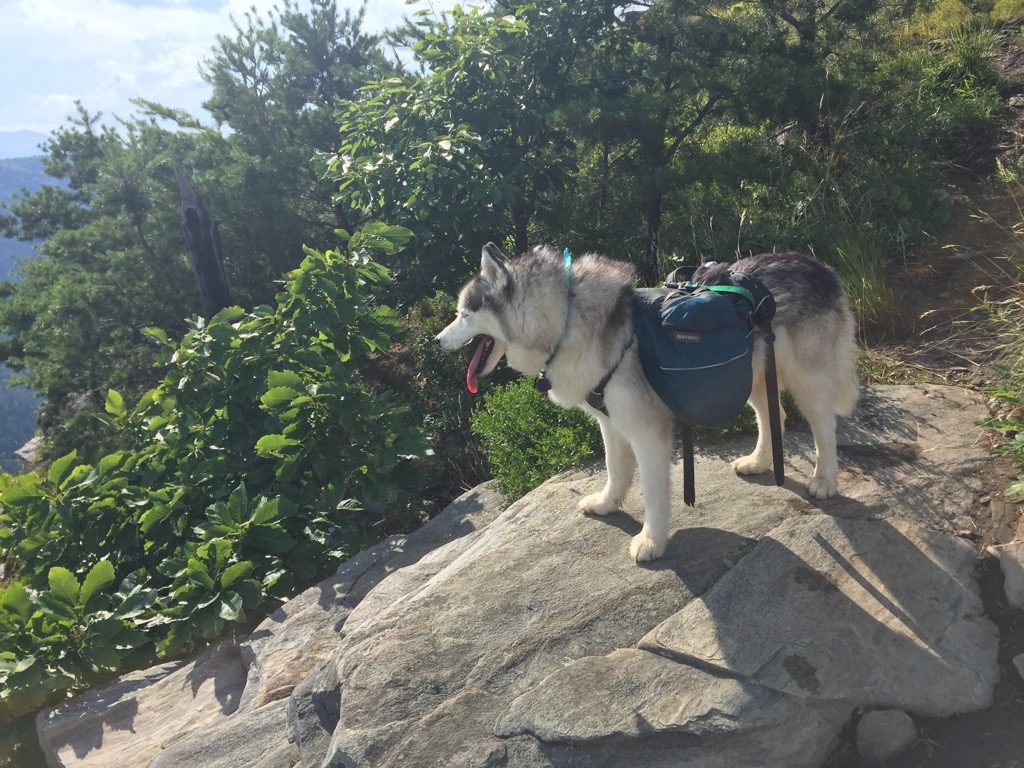
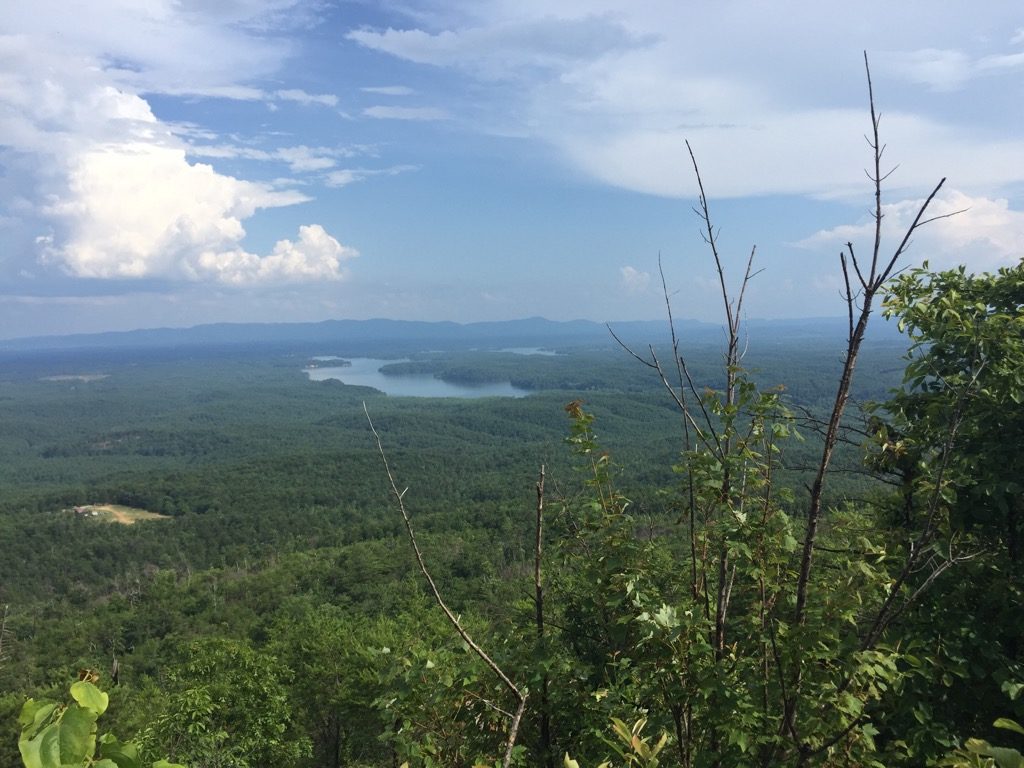
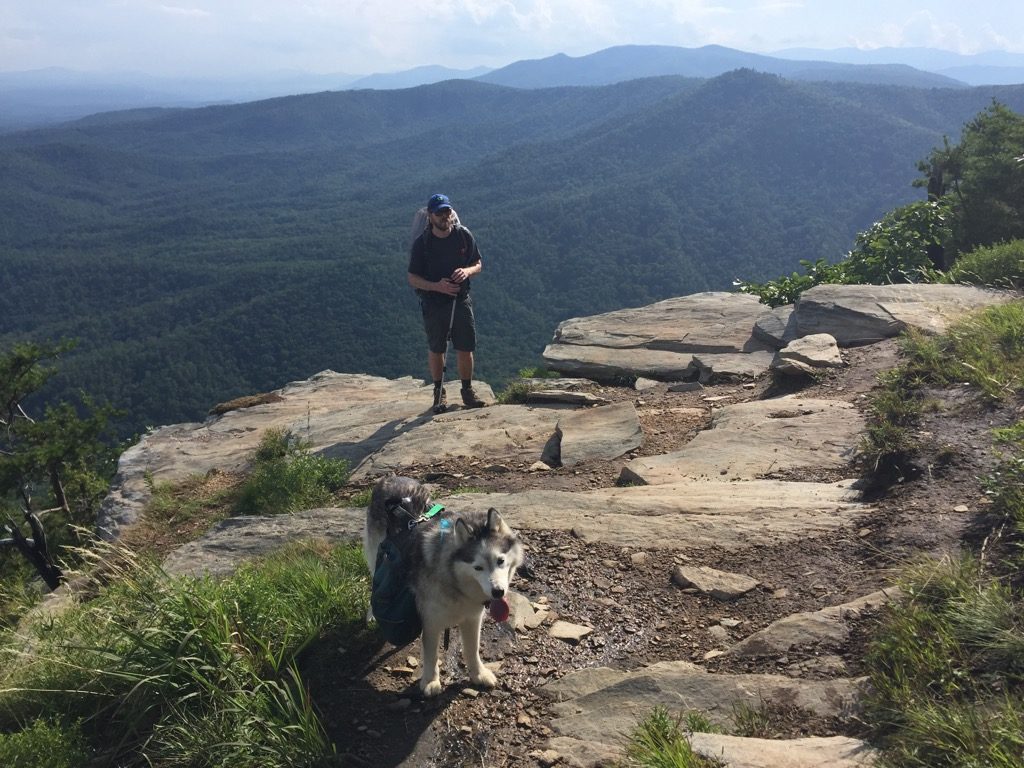
We briefly and uneventfully stopped at Gully Pipe so Chuck could re-up water. It is what it says: a grey pipe sticking out of the side of the mountain over a deep gully. The end. It’s on a crappy part of the trail, but accessible water would be nowhere until we reached camp.
After the initial climb, the trail evened in altitude but presented a new challenge: lush, overgrown vegetation and soppy trails from the 45 minute deluge that preceded. The trail muddied our boots; the vegetation, bloated with dew, whipped our clothes, leaving everything in our possession slightly moist. We trudged through at a feverish clip, making Saddle Camp by about 8:00. We set off down a steep side trail for a water fill and came back—breaking a second sweat coming back up the mountain to erect camp. Just as everything was in place, the deluge returned just as night fell. Too tired to eat dinner, I crawled into my hammock and fell in and out of sleep, only to awaken fully around 12:45 to the sound of Atticus licking the water off my tarp, which I discovered was in no condition to fully withstand the torrents. I crawled out to remove my contacts and pound a Nalgene of electrolytes, then crawl back in.
I was awake by 5 with the sun, but every time I summoned the gumption to get out of my hammock, the rain returned, and I returned to more sleep.
Tuesday (8.80 miles): Around 9, we were finally out of the hammocks. We milled around, readying breakfast, check the extent of the storm damage. It’s a late leave time, but on your first night when you come to camp in the near dark and survived the rain, taking stock seemed more important than a quick exit.
Around 10:30, we were near ready and a group of about ten giggling late-teen/early-twenties group of girls—having knocked out 1.5 miles already—came rolling into the site and halted on the trail. They seemed oblivious to us as they made their way to use the off-trail facilities. We hurried to get out and in front of them.
A good choice. Larger groups tend to move more slowly, and the 2.5 miles of brutal knee-to-nose climbing, rock scaling, and tedious tromping that followed slowed us enough on its own. From a distance in the previous twilight, the saddle up to Table Rock had seemed lush and magical; up close in the morning, the fog obscured the views into the Gorge and left little but the immediate steps of the snarling trail ahead. After an intense climb, the trail levels ever so briefly only to begin to descend into The Chimneys, an area popular with climbers such as the large group we passed. They cooed at dogs in backpacks, but we had to preserve what little momentum our trudging steps could muster. A group of trail runners passed us, mocking us with their empty shoulders and seemingly effortless movement over the boulders. The trail is rocky and technical. As it ascends back to the Table Rock parking area, the hands become as important as the feet—picking up the dogs by their back pack straps for a boost, and pulling ourselves through narrow crevices and up rocky faces.
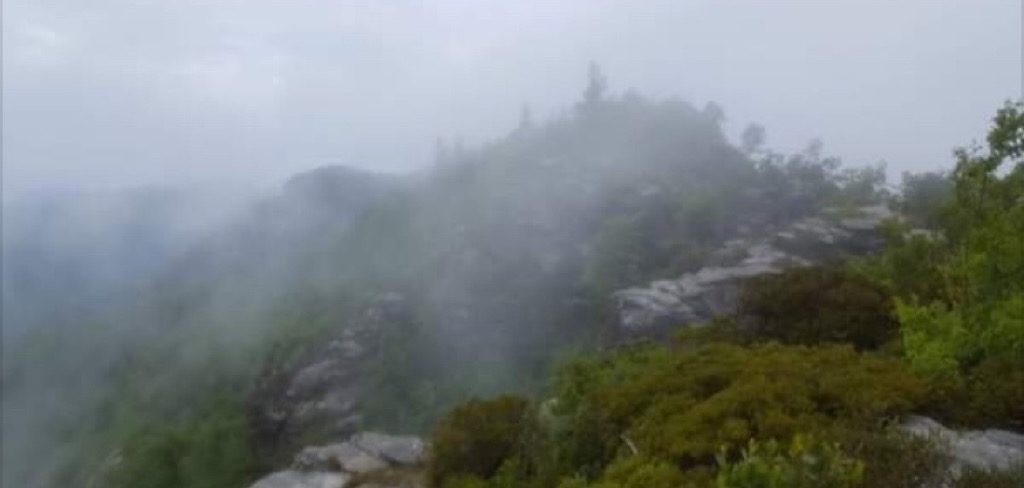
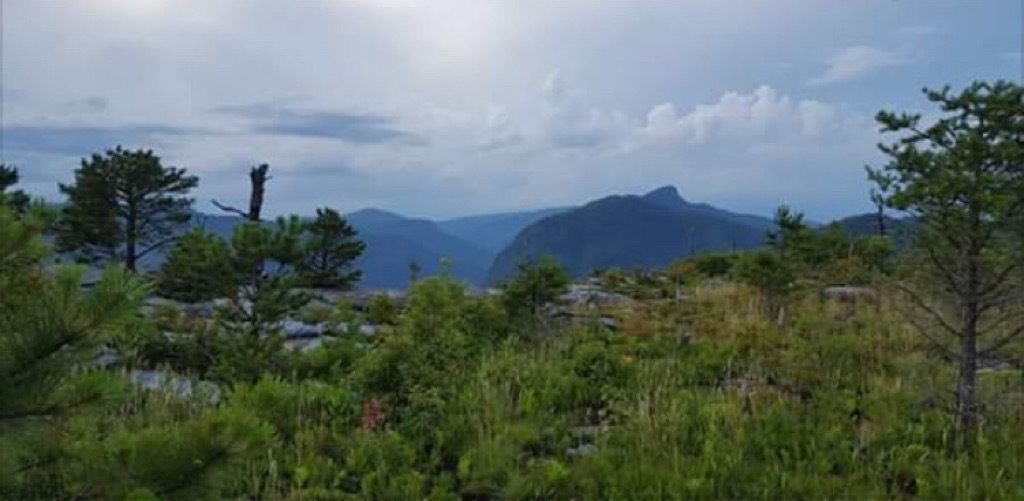
The moisture in the air did little to help dry the previous night’s damage, and by the time we reached the parking area, my socks felt like mud and quicksand in my own boots. You non-backpackers may find this disgusting, but I have ridden a pair of socks for multiple days only to use the spare pair as the gift for walking out; this would not be that trip. By 12:00 on Tuesday, I changed socks, liberally applied Gold Bond, and was officially out of perfectly clean socks for the rest of the week.
An hour’s stop in the picnic area for feet and snacks (it was a slow start) and we were back on the trail. We found a brief moment of levity—passing a “professional hiker” in the parking lot talking to a woman who swears her sister’s “Wott-Reiler” weighed 200 pounds—as a brief moment of grace before descending through one of the more demoralizing sections, a steep 1.4 mile drop from Table Rock to FS 496. Slippery Rocks. Steep downhill. We reached the bottom and stopped to refill water; Atticus exemplified our low morale when he went into the creek and ended up getting his backpack hooked on a stick as he tried to exit. Later, we would both agree, that this was a nadir of mental fatigue where we really had to ask ourselves why the hell we had chosen to do this.
I thought of Billy Crystal’s character in City Slickers. “Remember,” I sarcastically told myself, “you’re doing this because you like this. You’re doing this because you think it’s fun.”
Once we turned left off FS 496, our fortunes improved, both physically and mentally. The trail evened into a soft, even bed of pine needles. “I could run this all day,” said Chuck. And we did. Our pace picked up to knocking out around 2.5 miles an hour, making up somewhat for the slow start. Soon, we found a wide open campsite next to a creek around 4:00. We were still tired, but in much better spirits than we had been at our previous two stops.
“Look,” says Chuck. “We’re making good time. I think we should keep going and get some more miles in. Let’s cruise for another hour or two, then make camp.”
Cruise. Fateful word. Dependent on conditions and terrain. The thunder rumbled ominously in the distance. The trail crossed the creek, and instead of returning to a soft bed of needles, the next mile hugged the creek. The rain began softly and intermittently, but as it became clear that we would be walking on rock, it became more imperative to move before the hard rains came. We saw a giant waterfall below us in the brush; while a dip in a deep pool by the falls would be sublime, we needed to get off the river before the heavens opened up. We couldn’t take the time to explore, lest the storm break and we were stranded on wet rock below. At one point, Atticus found the appearance of a pool and a sandy beach alluring, looking at us like “Really? This looks nice. Let’s stay here and hang out.” His idea of paradise, his fatigue, kept him content, incapable or realizing the danger of staying up. Instead, I had to hump him over two rock climbs, the first of which led directly into walking up a cascading creek at a steep angle. On a sunny day, I would revel in the exploration of the area, but the impending storm made getting me and the recalcitrant Rottweiler up the trail.
Pushing him up the rocks and climbs took the wind out of me, and as the trail normalized somewhat, I saw Chuck at the top of a climb, huddled under branches. I stopped. In hindsight, we recognize the best thing to do is just keep walking. However, we learned that by stopping, thinking we could briefly wait out the storm.
But the storm persisted, and I finally yanked the tarp from my bag and threw it over us, just to keep some semblance of dryness. Hope would make it sound like it was subsiding, but we would lift the edge to a cold wind and to see it raining just as hard as before. This kept on for a good 30-45 minutes before we bit the bullet and decided that we had to make a go of it and find camp.
Fifteen minutes later, we came into a small flat spot before the trail ascended up the ridge again. It was not the most ideal or prettiest camping spot, but it had water access and was big enough for us. As we broke down our packs and set up camp, the rain finally relented and we had some semblance of normalcy.
The dogs were wiped, but in the lingering drizzle, we began the rudiments of making camp: getting water, setting up tarps, prepping food, feeding the dogs. They barely looked at their bowls. Juno fell asleep in her bowl, only waking so I couldn’t snap her picture. We fell into a quiet lull.
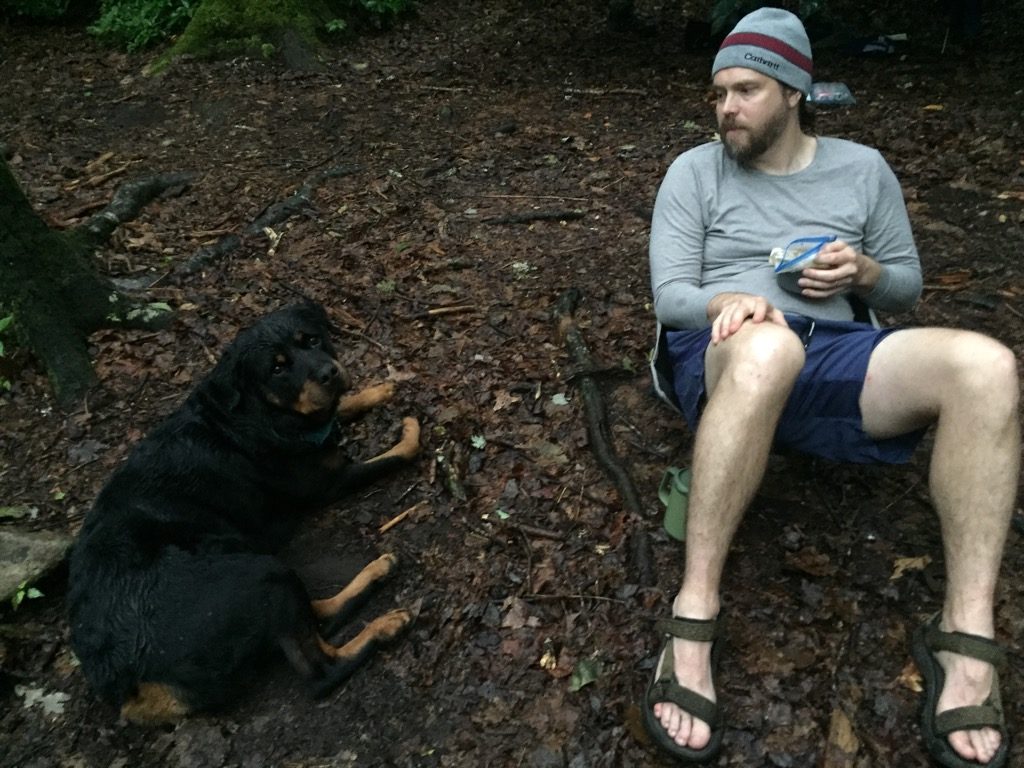
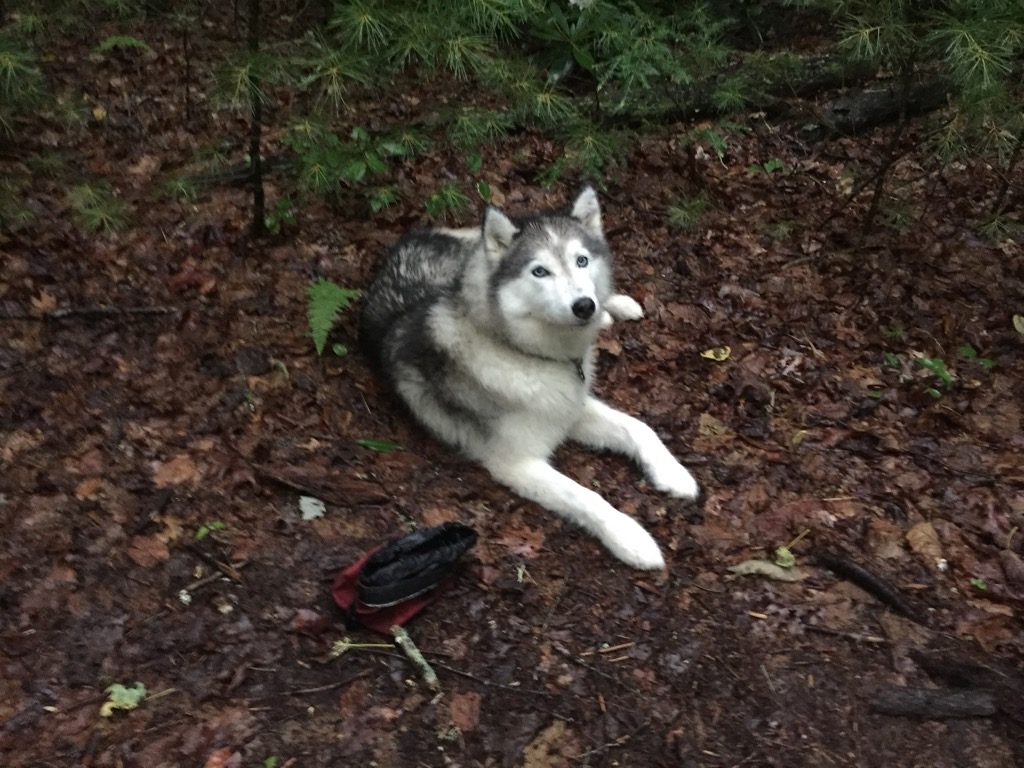
Having not moved since we stopped, Atticus stood up and barked as a thru-hiker came into camp. She asked if she could share, and we gladly gave her the space. The effort to start the fire was in vain, but it gave us an excuse to be out of our hammocks and socialize with Kate from Alaska, who decided on a lark to start backpacking, researched the MST, and flew halfway across the country to try it for the first time. We talked trails and gear and stories until we were all ready to turn in.
By dusk the rain had completely stopped, and though we had no fire, I had enough space to stretch out and time to write beside my camp site, both of which I crave on the trail, both of which I got for the first time on this trip. Despite the struggle of the last two days, I turned into my hammock and fell into peaceful, contented sleep.


Recent Comments